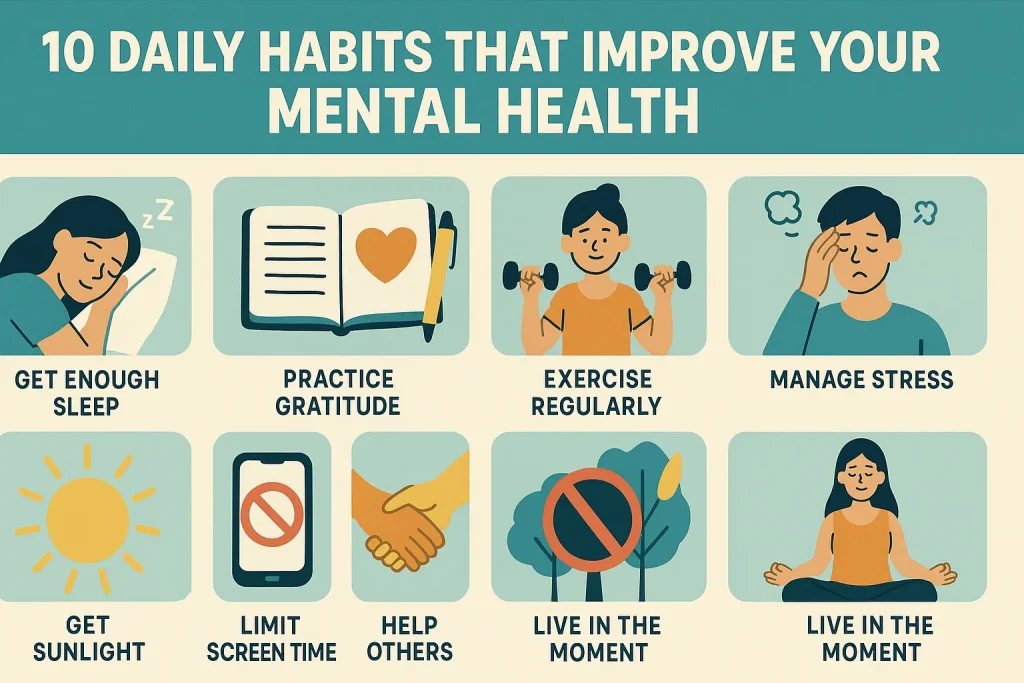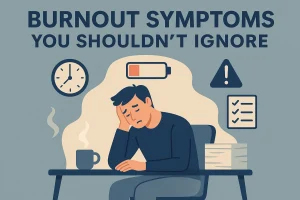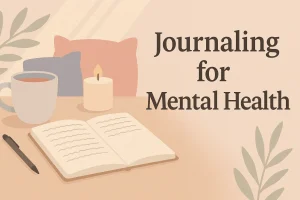10 Daily Habits That Improve Your Mental Health: A Comprehensive Guide to a Healthier Mind

In today’s fast-paced, high-pressure world, prioritizing mental health is not just a luxury—it’s a necessity. While we often focus on physical fitness and diet, our mental well-being is the foundation of a happy, fulfilling life. The great news is that you don’t need grand gestures to make a difference. Small, consistent daily habits can create a profound and lasting impact on your mental state. This 1500-word, SEO-optimized guide explores 10 evidence-based daily habits that can significantly improve your mental health, backed by research from leading U.S. institutions.
1. Prioritize Quality Sleep
The Bedrock of Mental Wellness
Sleep is the cornerstone upon which good mental health is built. During sleep, your brain works overtime to process emotions, consolidate memories, and flush out toxins. When you skimp on sleep, these critical processes are disrupted, leading to irritability, increased stress, and a higher risk of mood disorders. According to the National Institute of Mental Health (NIMH), sleep problems are a common symptom of many mental health conditions, including anxiety and depression. Chronic sleep deprivation can exacerbate these issues, creating a difficult cycle to break.
Research from institutions like Harvard Medical School underscores this connection, showing that even partial sleep deprivation can have a significant negative effect on mood. For instance, individuals with insomnia have a tenfold higher risk of developing depression compared to those who sleep well.
Actionable Habits:
- Aim for 7-9 hours: The CDC recommends this range for most adults to function optimally.
- Create a relaxing bedtime routine: Dim the lights, take a warm bath, read a book, or listen to calming music. This signals to your brain that it’s time to wind down.
- Establish a consistent sleep schedule: Go to bed and wake up around the same time every day, even on weekends, to regulate your body’s internal clock.
- Optimize your bedroom: Make your room a sleep sanctuary—dark, quiet, and cool.
2. Practice Daily Gratitude
Rewire Your Brain for Positivity
Gratitude is a powerful practice that can shift your perspective from what’s wrong in your life to what’s right. It involves intentionally acknowledging and appreciating the good things, no matter how small. This simple act can reduce symptoms of depression and anxiety by combating the brain’s natural negativity bias. When you practice gratitude, you activate the prefrontal cortex, the part of the brain associated with positive emotions and well-being.
A study published in the Journal of Personality and Social Psychology found that participants who wrote down things they were grateful for were more optimistic and felt better about their lives. It’s a low-effort, high-impact tool for mental wellness.
Actionable Habits:
- Keep a gratitude journal: Each night, write down three to five specific things you are thankful for from your day.
- Express your gratitude directly: Make it a point to thank someone verbally or with a handwritten note. This strengthens social bonds and amplifies positive feelings for both of you.
- Practice mindful appreciation: Take a moment to savor a good meal, a beautiful sunset, or a comfortable moment.
3. Limit Screen Time and Social Media
Protect Your Mental Space in the Digital Age
While technology connects us, excessive use of social media can be detrimental to mental health. The constant comparison to the curated, seemingly perfect lives of others can fuel feelings of inadequacy, loneliness, and anxiety (often termed “compare and despair”). The American Psychological Association (APA) has noted the link between high social media use and increased mental health issues, particularly among teens and young adults.
The endless scroll can also lead to information overload and keep your nervous system in a state of high alert, making it difficult to relax and be present in your own life.
Actionable Habits:
- Set daily time limits: Use your phone’s built-in wellness features to track and limit your time on specific apps.
- Schedule digital detoxes: Designate screen-free periods, such as during meals, the first hour of your day, and the hour before bed.
- Curate your feed: Unfollow accounts that make you feel bad about yourself. Follow those that are inspiring, educational, or genuinely positive.
4. Nurture Your Social Connections
The Power of Human Connection
Humans are social creatures, and meaningful connections are vital for mental health. Loneliness and social isolation are significant risk factors for depression, anxiety, and cognitive decline. Conversely, spending quality time with supportive friends and family can boost your sense of belonging, purpose, and self-worth. The U.S. Surgeon General’s advisory on loneliness highlights it as a public health crisis, with health risks as damaging as smoking 15 cigarettes a day.
Strong social support systems act as a buffer against life’s stressors, providing comfort and perspective when you need it most.
Actionable Habits:
- Prioritize face-to-face interaction: While digital communication is convenient, in-person contact is more effective at building deep connections.
- Schedule regular social time: Treat catch-ups with friends and family like any other important appointment.
- Join a group or club: Pursue a hobby in a social setting, whether it’s a book club, sports team, or volunteer organization.
5. Incorporate Mindfulness and Meditation
Anchor Your Mind in the Present
Mindfulness is the practice of paying attention to the present moment without judgment. Meditation is a formal way to cultivate this skill. These practices help you break free from ruminating on the past or worrying about the future—two common drivers of anxiety and depression. Research has shown that regular mindfulness meditation can actually change the brain’s structure, increasing gray matter in areas associated with emotional regulation and decreasing it in the amygdala, the brain’s fear center.
A landmark study from Johns Hopkins University found that mindfulness meditation was just as effective as antidepressants in reducing symptoms of depression and anxiety.
Actionable Habits:
- Start small: Begin with 5-10 minutes of guided meditation each day using apps like Calm or Headspace.
- Practice mindful breathing: Throughout the day, take a few moments to focus solely on your breath, inhaling deeply and exhaling slowly.
- Engage your senses: Practice mindfulness during routine activities. Fully experience the taste and texture of your food, the feeling of water in the shower, or the sounds of your environment during a walk.
6. Fuel Your Body with a Healthy Diet
The Gut-Brain Connection
The link between what you eat and how you feel is undeniable. Your brain requires a steady supply of nutrients to function correctly. A diet rich in whole foods—fruits, vegetables, lean proteins, and healthy fats—can support brain health and improve mood. In contrast, a diet high in processed foods, sugar, and unhealthy fats has been linked to inflammation and an increased risk of depression. This is often referred to as the “gut-brain axis,” as the gut produces about 95% of the body’s serotonin, a key neurotransmitter for mood regulation.
Actionable Habits:
- Eat a rainbow of whole foods: Fill your plate with nutrient-dense, unprocessed foods.
- Stay hydrated: Dehydration can impact your mood and cognitive function. Drink plenty of water throughout the day.
- Incorporate omega-3 fatty acids: Found in fatty fish (like salmon), walnuts, and flaxseeds, these are essential for brain health.
- Limit sugar and refined carbs: These can cause energy crashes and negatively affect your mood.
7. Move Your Body Daily
Nature’s Mood Booster
Physical activity is one of the most powerful tools for improving mental health. Exercise releases endorphins, which have mood-boosting and pain-relieving effects. It also reduces levels of the body’s stress hormones, adrenaline and cortisol. Regular exercise can reduce stress, improve sleep quality, and boost self-esteem. The Anxiety & Depression Association of America (ADAA) states that even a single bout of exercise can provide several hours of relief from anxiety symptoms.
Actionable Habits:
- Find an activity you enjoy: You’re more likely to stick with it if it doesn’t feel like a chore. This could be dancing, hiking, swimming, or cycling.
- Aim for consistency, not intensity: The goal is at least 30 minutes of moderate-intensity exercise most days of the week.
- Incorporate movement into your day: Take the stairs instead of the elevator, walk during phone calls, or do stretching breaks at your desk.
8. Establish a Consistent Routine
Create Stability and Predictability
In a world that can often feel chaotic, a daily routine provides a sense of structure, predictability, and control. This can be incredibly grounding and can lower stress levels. A routine helps automate decision-making for everyday tasks, freeing up mental energy for more complex challenges. It also ensures you make time for the healthy habits that support your mental well-being, such as exercise, meals, and relaxation.
Actionable Habits:
- Anchor your day: Start and end your day consistently with routines for waking up and winding down.
- Plan your days: Structure your day around your most important tasks, but also schedule time for breaks and leisure.
- Prepare for success: Lay out your clothes or pack your lunch the night before to simplify your mornings and reduce decision fatigue.
9. Practice Self-Compassion
Treat Yourself with Kindness
We are often our own harshest critics. Self-compassion involves treating yourself with the same kindness, understanding, and support you would offer to a good friend who is struggling. It’s about acknowledging your imperfections and failures without judgment. Dr. Kristin Neff, a leading researcher in this field, defines it as having three components: self-kindness, a sense of common humanity (recognizing that everyone suffers), and mindfulness.
Practicing self-compassion is strongly linked to greater emotional resilience, reduced anxiety and depression, and a more positive outlook on life.
Actionable Habits:
- Challenge your inner critic: When you notice negative self-talk, gently ask yourself if you would say that to a friend. Reframe the thought into something more supportive.
- Take a self-compassion break: In moments of stress, pause, acknowledge your pain, remind yourself that suffering is part of life, and offer yourself a few words of kindness.
- Comfort yourself physically: Simple acts like placing a hand over your heart or giving yourself a hug can trigger a soothing response.
10. Engage in Hobbies and Creative Outlets
Nourish Your Soul and Reduce Stress
Making time for activities you genuinely enjoy is crucial for stress management and overall well-being. Hobbies provide an escape from the pressures of daily life and allow you to enter a state of “flow,” where you are fully immersed and energized by an activity. Whether it’s painting, gardening, playing an instrument, or coding, hobbies can boost your self-esteem, reduce stress, and provide a sense of accomplishment.
Engaging in creative activities stimulates different parts of your brain, promoting new neural pathways and providing a non-verbal way to process emotions.
Actionable Habits:
- Schedule time for your hobbies: Treat this time as a non-negotiable appointment with yourself.
- Rediscover old passions or explore new ones: Don’t be afraid to try something you’ve always been curious about.
- Focus on the process, not the product: The joy of a hobby lies in the act of doing it, not necessarily in achieving a perfect result.
Conclusion: A Journey, Not a Destination
Improving your mental health is an ongoing journey, not a one-time fix. By integrating these 10 daily habits into your life, you can build a strong foundation for lasting mental well-being. Start small, be patient with yourself, and celebrate your progress along the way. Remember, taking care of your mind is one of the most profound acts of self-care and the most important investment you can make in your overall health and happiness. If you are struggling, don’t hesitate to reach out to a mental health professional for support.




No comments yet. Be the first to comment!